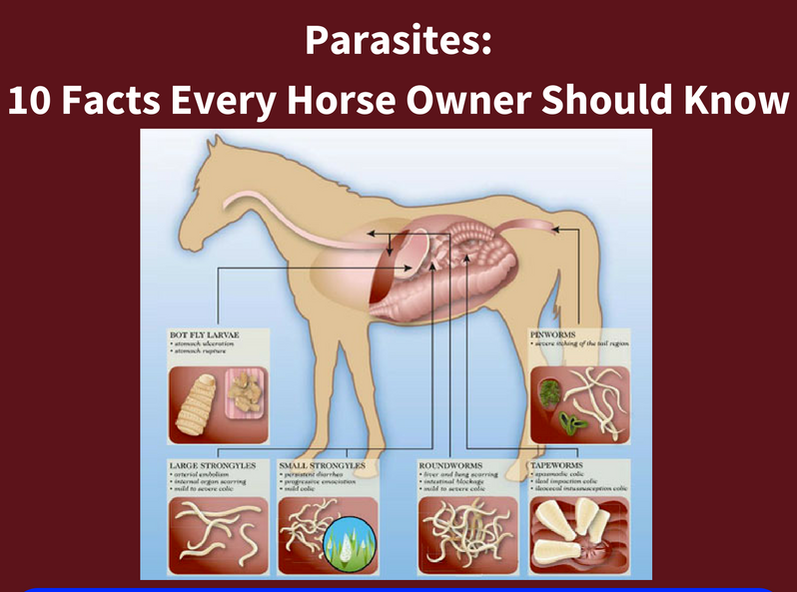|
Take the short Parasite Pop Quiz and test your parasite IQ! Knowing the answers to these 11 true or false questions could save your horse's life! QUESTIONS: TRUE OR FALSE
1. Large Strongyles are the most dangerous parasite for horses. False Almost all dewormers effectively kill large strongyles. Therefore they are quite rare and pose little threat to regularly dewormed horses. 2. There is a single wormer that kills all equine parasites. False Moxidectin plus praziquantel (Quest Plus) works well against encysted small strongyles, large strongyles and tapeworms. However, it does not work well against ascarids in foals and should not be used on foals less than six months old. It is also important to switch classes of wormer to prevent resistant worms from developing on your property. 3. There are no negative ramifications if I underdose my horse on dewormer. False Underdosing horses leads to resistance by only killing the most susceptible parasites and leaving the strongest ones to reproduce. 4. Horses naturally acquire immunity to ascarids after 18 months of age. True Young horses are very susceptible to ascarid impactions, and should be wormed regularly with fenbendazole (panacur) at a 10 mg/kg dose for 5 days in a row to kill them. 5. The best way to manage pastures is to spread manure on them. False Spreading manure on your pastures can actually increase the parasite burden on your farm, unless the weather is hot and dry enough to effectively kill all the eggs. 6. Hot dry weather kills parasite eggs better than freezing temperatures. True More parasite eggs are killed in hot dry weather then freezing temps. 7. Small strongyles are becoming resistant to all available dewormers. True The adult version of small strongyles are fairly easy to kill while the encysted form are only susceptible to moxidectin for the time being 8. All horses on the same property will have the same parasite burden. False Younger horses often have higher worm burdens because they have less immunity, and just like people, some horses have less immunity and some have more. 9. A negative fecal exam means I never need to deworm my horse. False Fecal egg counts can quite often have false negative results, meaning that they come back negative but testing a different fecal ball or a different pile of manure from your horse would actually have a positive result. Knowing that, all horses should be wormed a minimum of twice per year. 10. I’ve always used the same product. It works, so I don’t need to change it. False Using the same product over and over breeds resistance in your parasite population. It also doesn’t kill all stages and types of parasite. Rotating wormers and using the appropriate one for the age of your horse is important. 11. Moxidectin (Quest) should not be used on foals less than 6 months. True Horses less than 6 months of age have a higher incidence of adverse reactions, including ataxia, depression/lethargy and recumbency. Very old and very thin or sick horses should also avoid moxidectin. How did you do on the pop quiz? What did you learn? What worming products and protocol do you use on your horse? Join the conversation and share your insights and ideas on the Stretch Your Horse Facebook page. This Parasite Pop Quiz was developed by a staff veterinarian at Oakhurst Equine Veterinary Services. Contact Dr. Jack Root or Dr. Sylvia Ouellette (pronounced Wool-lette) at Oakhurst Equine if you have questions or need assistance devising an effective worming protocol for your horse. (503) 554-0227.
0 Comments
Your comment will be posted after it is approved.
Leave a Reply. |
Blog Topics
All
AuthorIlene Nessenson, Certified Equine Bodyworker, is the creator of Stretch Your Horse, a 25 horse stretching video tutorial collection. Archives
November 2023
|


 RSS Feed
RSS Feed
